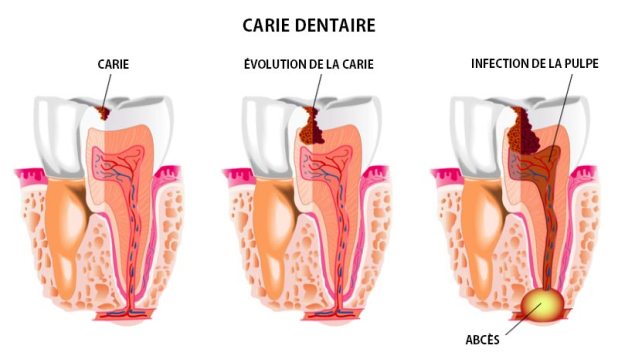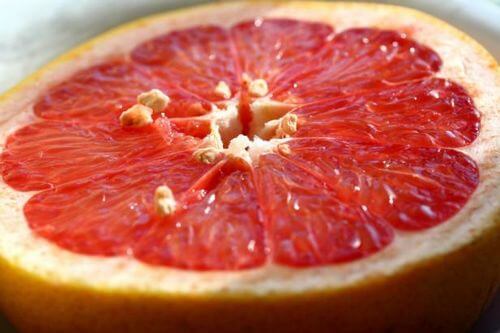The mouth is the place of the body that contains the most micro-organisms. Bacteria, viruses, yeasts, etc. are all found in very large numbers. They constitute the oral flora. Fortunately, most of these germs are harmless. In some cases, this oral flora can become unbalanced and favor the proliferation of certain bacteria. This will sometimes lead to dental infections or gum disease.
It is certain that good dental and oral hygiene is the first line of prevention. It is usually sufficient if accompanied by regular (once a year) visits to the dentist. There may be sneaky, painless and therefore undetectable infections, but this is quite rare.
Oral infections are favored by cavities that must be treated without delay, or by gum inflammation that must be detected early enough to avoid complications.
Everyone knows that cavities are favored by a high consumption of sugar, as well as by a bad brushing of the teeth. Warning signs that may suggest a cavity are sensitivity to hot, cold and sweet foods.
It is recommended to brush your teeth in the morning (after breakfast) and at night (before bedtime) with a natural toothpaste without fluoride. Also, it is recommended to avoid vigorous brushing as well as toothbrushes with too hard bristles in order to avoid enamel wear.
Visit the dentist at the first signs of sensitivity and fill any cavities as soon as possible, avoiding dental amalgams containing heavy metals such as mercury.

Gum disease begins with gingivitis, a chronic inflammatory disease of the gums. It is very common, affecting 60% to 80% of dental patients. It is manifested by swelling, redness and bleeding of the gums. It is generally the dental plaque which is the origin. In fact, poorly controlled dental plaque penetrates deep between the tooth and the gum, creating a space where pathogenic bacteria can proliferate. Gingivitis is favored by factors such as smoking, taking medication, but also by stress. If left untreated, it can develop into periodontitis.
These periodontal problems should be monitored because, if left untreated, they can lead to the destruction of the supporting tissues of the teeth and eventually result in tooth loosening and the loss of one or more teeth.
Signs such as spontaneous or brushing bleeding, recurrent bad breath, or shifting or changing dental occlusion should be noted as possible signs of periodontitis. It is best to act before the problem becomes irreversible.
Some bacterial infections may be more sudden and result in a dental abscess. It is almost always accompanied by swelling of the gums, severe pain and in some cases fever. A dental abscess is a bacterial infection. It is obvious that in this case you need to consult a dentist who will apply a simple treatment: empty the abscess and clean the gum.
Fortunately, not all oral infection problems require such procedures. There are natural and effective ways to avoid or get rid of them.
Some preventive measures for good oral hygiene
- Mouthwash with calendula mother tincture (10 drops 1 time daily in a base of water) or with grapefruit seed extract (depending on the concentration of the product: 4 to 10 drops 1 time a day in a base of water) or with hydrolat (floral water) of cinnamon.
- Brushing teeth once or twice a week with baking soda. For this purpose, choose the finest one, which is usually used for cosmetics.
- Regular use of brushes, dental floss or pressure jets.
- Taking oral of coenzyme Q 10 (minimum 50 mg per day)
Some effective actions to take in case of an oral infection

Natural antibiotics or eubiotics that destroy only the harmful germs while respecting the useful bacteria:
Taken orally:
- Grapefruit seed extract: depending on the concentration of the product : 4 to 10 drops 3 to 4 times a day in water.
- Broad Spectrum Propolis: 4 to 5 drops 3 times daily in a base of water.
- Oleoaromatic capsules of Shell or Garden Marjoram (Origanum majorana - Garden Marjoram): 2 capsules 3 times daily for 7 days.
- More advanced cases: oleoaromatic capsules of compact oregano (Origanum compactum or Vulgaria - Wild Marjoram): 2 capsules before/during meals, 3 times a day, for 5 to 7 days.
- Tea tree (Tea tree or Melaleuca alternifolia): 5 drops of essential oil diluted in 1 teaspoon of honey, 3 times daily.
- Homeopathic remedy to buy at a pharmacy: Pyrogenium 30 K or 5 CH: 3 granules 3 times a day on an empty stomach (at least ¼ hour before meals), for 5 days.
As a topical application:
- Clove (Eugenia caryophyllata) or Shell Marjoram: 1 drop of this essential oil on a cotton swab or fingertip and swab the gum at the site of the infection, 3 to 5 times a day, for 2 to 3 days.
- For the more sensitive: dilute in 5 ml (adults) 10 ml of vegetable oil (olive, hazelnut or St. John's wort) 2 drops of clove oil and 2 drops of Peppermint (natural painkiller), apply to the affected area 3 to 5 times a day, for 2 to 3 days.
- Other massage lotion: 1 drop of True Lavender (Lavandula angustifolia) - 1 drop of Noble Laurel (Laurus nobilis) - 1 drop of Clove oil or Origanum compactum in 3 drops of St. John's wort vegetable oil, apply to the affected area 3 to 5 times a day, for 2 to 3 days.
- These same mixtures can be used in local application for children provided that the quantity of vegetable oil used is doubled or the quantity of essential oils is halved.
- Mouthwash from this same massage lotion recipe: add ½ glass of warm water and use the mixture (without swallowing) to rinse the mouth after each meal.



